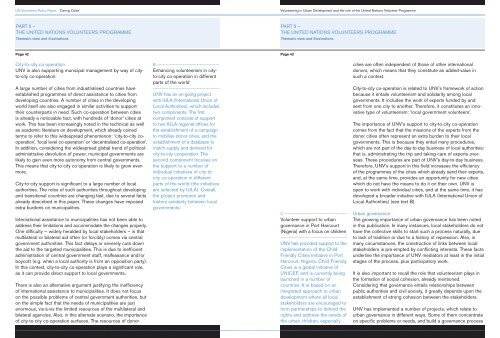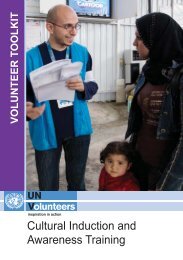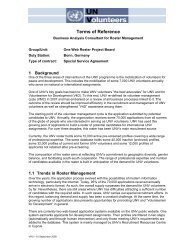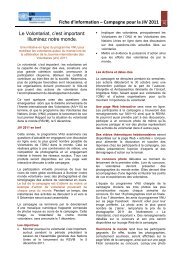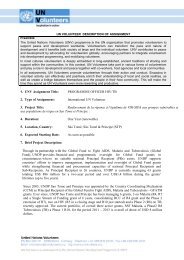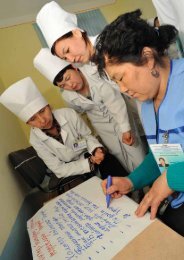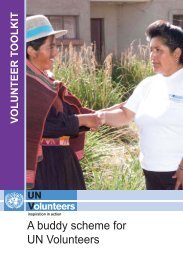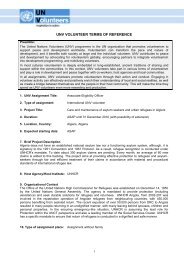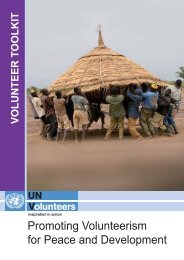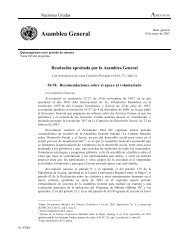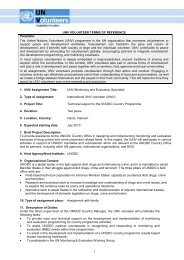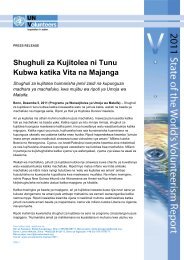View associated PDF document - United Nations Volunteers
View associated PDF document - United Nations Volunteers
View associated PDF document - United Nations Volunteers
Create successful ePaper yourself
Turn your PDF publications into a flip-book with our unique Google optimized e-Paper software.
UN <strong>Volunteers</strong> Policy Paper<br />
‘Caring Cities’<br />
Volunteering in Urban Development and the role of the <strong>United</strong> <strong>Nations</strong> Volunteer Programme<br />
PART II –<br />
THE UNITED NATIONS VOLUNTEERS PROGRAMME<br />
Thematic view and illustrations<br />
PART II –<br />
THE UNITED NATIONS VOLUNTEERS PROGRAMME<br />
Thematic view and illustrations<br />
Page 42<br />
Page 43<br />
City-to-city co-operation<br />
UNV is also supporting municipal management by way of cityto-city<br />
co-operation.<br />
A large number of cities from industrialised countries have<br />
established programmes of direct assistance to cities from<br />
developing countries. A number of cities in the developing<br />
world itself are also engaged in similar activities to support<br />
their counterparts in need. Such co-operation between cities<br />
is already a noticeable fact, with hundreds of ‘donor’ cities at<br />
work. This has been increasingly noted in the technical as well<br />
as academic literature on development, which already coined<br />
terms to refer to this widespread phenomenon: ‘city-to-city cooperation’,<br />
‘local level co-operation’ or ‘decentralised co-operation’.<br />
In addition, considering the widespread global trend of politicaladministrative<br />
devolution of power, municipal governments are<br />
likely to gain even more autonomy from central governments.<br />
This means that city-to-city co-operation is likely to grow even<br />
more.<br />
City-to-city support is significant to a large number of local<br />
authorities. The roles of such authorities throughout developing<br />
and transitional countries are changing fast, due to several facts<br />
already described in this paper. These changes have imposed<br />
extra burdens on municipalities.<br />
International assistance to municipalities has not been able to<br />
address their limitations and accommodate the changes properly.<br />
One difficulty — widely heralded by local stakeholders – is that<br />
multilateral or bilateral aid often (or forcibly) comes via central<br />
government authorities. This fact delays or severely cuts down<br />
the aid to the targeted municipalities. This is due to inefficient<br />
administration of central government staff, malfeasance and/or<br />
boycott (e.g. when a local authority is from an opposition party).<br />
In this context, city-to-city co-operation plays a significant role,<br />
as it can provide direct support to local governments.<br />
There is also an alternative argument justifying the inefficiency<br />
of international assistance to municipalities. It does not focus<br />
on the possible problems of central government authorities, but<br />
on the simple fact that the needs of municipalities are just<br />
enormous, vis-à-vis the limited resources of the multilateral and<br />
bilateral agencies. Also, in this alternate scenario, the importance<br />
of city-to-city co-operation surfaces. The resources of donor<br />
B --------------------------------------------<br />
Enhancing volunteerism in cityto-city<br />
co-operation in different<br />
parts of the world<br />
-----------------------------------------------<br />
UNV has an on-going project<br />
with IULA (International Union of<br />
Local Authorities), which includes<br />
two components. The first<br />
component consists of support<br />
to two IULA regional offices for<br />
the establishment of a campaign<br />
to mobilise donor cities, and the<br />
establishment of a database to<br />
match supply and demand for<br />
city-to-city cooperation. The<br />
second component focuses on<br />
the support to a number of<br />
individual initiatives of city-tocity<br />
co-operation in different<br />
parts of the world (the initiatives<br />
are selected by IULA). Overall,<br />
the project promotes and<br />
fosters solidarity between local<br />
governments.<br />
C --------------------------------------------<br />
Volunteer support to urban<br />
governance in Port Harcourt<br />
(Nigeria) with a focus on children<br />
-----------------------------------------------<br />
UNV has provided support to the<br />
implementation of the Child<br />
Friendly Cities Initiative in Port<br />
Harcourt, Nigeria. Child Friendly<br />
Cities is a global initiative of<br />
UNICEF, and is currently being<br />
launched in a number of<br />
countries. It is based on an<br />
integrated approach to urban<br />
development where all local<br />
stakeholders are encouraged to<br />
form partnerships to defend the<br />
rights and address the needs of<br />
the urban children, especially<br />
cities are often independent of those of other international<br />
donors, which means that they constitute an added-value in<br />
such a context.<br />
City-to-city co-operation is related to UNV’s framework of action<br />
because it entails volunteerism and solidarity among local<br />
governments. It includes the work of experts funded by and<br />
sent from one city to another. Therefore, it constitutes an innovative<br />
type of volunteerism: ‘local government volunteers’.<br />
The importance of UNV’s support to city-to-city co-operation<br />
comes from the fact that the missions of the experts from the<br />
donor cities often represent an extra burden to their local<br />
governments. This is because they entail many procedures,<br />
which are not part of the day-to-day business of local authorities:<br />
that is, administrating the trip and taking care of experts overseas.<br />
These procedures are part of UNV’s day-to-day business.<br />
Therefore, UNV’s support in this field increases the efficiency<br />
of the programmes of the cities which already send their experts,<br />
and, at the same time, provides an opportunity for new cities<br />
which do not have the means to do it on their own. UNV is<br />
open to work with individual cities, and at the same time, it has<br />
developed a broader initiative with IULA (International Union of<br />
Local Authorities) (see text B).<br />
Urban governance<br />
The growing importance of urban governance has been noted<br />
in this publication. In many instances, local stakeholders do not<br />
have the collective skills to start such a process naturally, due<br />
to lack of tradition or due to a history of repression. Also, in<br />
many circumstances, the construction of links between local<br />
stakeholders is pre-empted by conflicting interests. These facts<br />
underline the importance of UNV mediators at least in the initial<br />
stages of the process, plus participatory work.<br />
It is also important to recall the role that volunteerism plays in<br />
the formation of social cohesion, already mentioned.<br />
Considering that governance entails relationships between<br />
public authorities and civil society, it greatly depends upon the<br />
establishment of strong cohesion between the stakeholders.<br />
UNV has implemented a number of projects, which relate to<br />
urban governance in different ways. Some of them concentrate<br />
on specific problems or needs, and build a governance process


